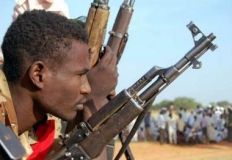Darfur unity meeting may further divide rebels
Nov 1, 2005 (KHARTOUM) — A Darfur rebel unity conference, in jeopardy as some leaders refused to attend, could instead divide the movement further and complicate peace talks to end the revolt which has cost the lives of tens of thousands, members said on Tuesday.
 The congress in Darfur aims to unite the Sudan Liberation Army (SLA), whose splits have escalated violence on the ground and stalled African Union-sponsored peace talks. It is scheduled to elect a new leadership, but the SLA president refused to attend.
The congress in Darfur aims to unite the Sudan Liberation Army (SLA), whose splits have escalated violence on the ground and stalled African Union-sponsored peace talks. It is scheduled to elect a new leadership, but the SLA president refused to attend.
“Nobody invited me to the conference,” President Abdel Wahed Mohamed el-Nur told Reuters from the mountainous headquarters of the rebel, Jabel Marra. Nur returned to Darfur last week for the first time in more than 18 months, a move many say was to garner support ahead of the congress.
Many members said if Nur did not attend the conference he would not be elected, which would deeply divide the group. Nur is still respected as the figurehead leader of the SLA, which launched a rebellion in early 2003, accusing Khartoum of monopolising wealth and power.
But many military commanders went to the conference, where thousands of fighters in sawn-off vehicles paraded before the commander-in- chief Juma’a Haggar and Secretary-General Minni Arcua Minnawi. Minnawi urged Nur to come to the congress being held in a remote rebel- held area called Haskanita.
Nur said he was not involved in the preparations for the conference from the beginning so would not go. He said he would go to a U.S.- sponsored meeting in the Kenyan capital Nairobi on November 8, where he would meet Minnawi.
Then he would tour rebel areas to meet commanders and determine another date for a unity conference in the remote west of Sudan. Tens of thousands have been killed and more than 2 million forced from their homes during the fighting, called genocide by the United States. Khartoum denies the charge, but the International Criminal Court is investigating alleged war crimes in the area.
“I will go to any area where there are military commanders and consult with them,” Nur said.
Nur and Minnawi have clashed over personality differences many times over the past year. They have separate offices in the Eritrean capital Asmara and rarely present a united front.
A mediation team which came to bridge the gap between Nur and Minnawi two days ago was at the congress site but had yet to meet with Minnawi. “We are still waiting,” Ahmed Abdel Shafiq Yagoub said. “The conference is still going on.”
The United Nations was not represented at the congress because they said only one faction was participating. Top U.N. envoy in Sudan Jan Pronk had initially encouraged the meeting and offered all support possible.
“We are not going because it’s not an all-inclusive conference,” said U.N. spokeswoman Radhia Achouri. But observers said that was taking Nur’s side and instead the international community should push all leaders to attend the congress, called by the grass roots of the SLA.
“They are encouraging Nur’s intransigence,” said one international observer. Some in attendance at the congress said they wanted the congress to democratise the movement with elections and that Nur should attend.
“We want to see this movement democratised and for the leaders to unite and overcome their differences,” said tribal leader Tajeddin Ibrahim from Labado town in South Darfur.
But some leaders at the congress expressed concern that the congress would go ahead and elect a new leadership without Nur’s participation, which would create more factionalism.
“I don’t think they should go ahead with the elections, as this would divide the leadership,” the elderly humanitarian coordinator of the SLA Suleiman Adam Jamous told Reuters in Haskanita. He said Nur would only take a few hundred fighters with him, but that any division was in the government’s interest.
“They are too young,” he said. “This struggle is older than them,” he said, chiding them for putting their personality differences over the cause.
Darfur, a vast region the size of France, was an independent sultanate until 1916 when the British incorporated it into Sudan. The non-Arab tribes, mainly the Fur and Zaghawa, feel marginalised by the central tribes who have run government in Khartoum since independence in 1956.
(Reuters)
